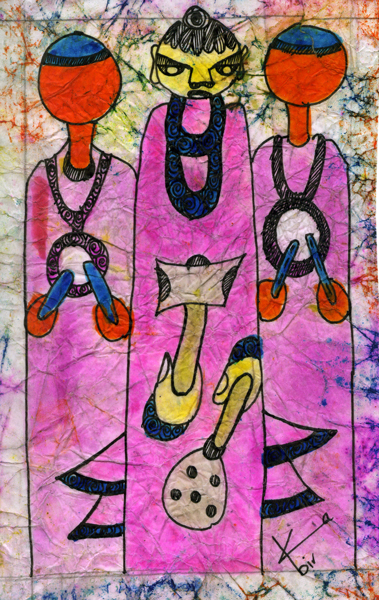Sango
The God of Thunder and Sky

In Yoruba mythology (Sango, Xango, Shango, Chang� in Latin America, also known as Jakuta ) is perhaps the most popular Orisha; he is a Sky Father, god of Thunder and lightning. Sango was a royal ancestor of the Yoruba as he was the third king of the Oyo Kingdom. In the Lukumi (O lukumi = "my friend") religion of the Caribbean, Shango is considered the center point of the religion as he represents the Oyo people of West Africa. The Oyo Kingdom was sacked and pillaged as part of a jihad by the Islamic Fulani Empire.
All the major initiation ceremonies (as performed in Cuba, Puerto Rico and Venezuela for the last few hundred years) are based on the traditional Shango ceremony of Ancient Oyo. This ceremony survived the Middle Passage and is considered to be the most complete to have arrived on Western shores. This variation of the Yoruba initiation ceremony became the basis of all Orisha initiations in the West.
The energy given from this Deity of Thunder is also a major symbol of African resistance against an enslaving European culture. He rules the color red and white; his sacred number is 6; his symbol is the oshe (double-headed axe), which represents swift and balanced justice. He is owner of the Bata (3 double-headed drums) and of music in general, as well as the Art of Dance and Entertainment.He is represented with Saint Jerome
Mythology
Sango (or Jakuta) was the fourth king of Oyo in Yorubaland, and deified after his death; mythologically, he (along with 14 others) burst forth from the goddess Yemaja's body after her son, Orungan, attempted to rape her for the second time. of course there are several myths regarding the birth and parentage of Sango.
He is a major character in the divination literature of the Lukumi religion. Stories about Sango's life exemplify some major themes regarding the nature of character and destiny. In one set of stories Sango is the son of Aganju and Obatala. As the story goes, Obatala, the king of the white cloth was travelling and had to cross a river. Aganju, the ferryman and god of fire, refused him passage. Obatala retreated and turned himself into a beautiful woman. He returned to the river and traded his/her body for passage.
Sango was the result of this uneasy union. This tension between reason represented by Obatala and fire represented by Aganju would form the foundation of Shango's particular character and nature. In further patakis Sango goes in search of Aganju, his father, and the two of them play out a drama of conflict and resolution that culminates with Shango throwing himself into the fire to prove his lineage.
All of the stories regarding Shango revolve around dramatic events such as this one. He has three wives; his favorite (because of her excellent cooking) is Oshun , a river goddess. His other wife,Oba, another river goddess, offered Sango her ear to eat. He scorned her and she became the Oba River, which merges with the Oshun River to form dangerous rapids. Lastly, was Shango's third wife, and stole the secrets of his powerful magic
The story of Sango and Oba carries the familiar refrain, "all that glitters is not gold". As has been stated Sango had three wives, Oba, his first and legitimate wife, Oya, his second wife, and Oshun his concubine. At that time and in that place they would live in a compound. In that compound, Sango had his own house and each wife had her own house surrounding his. He would then visit his wives in their houses to eat and to sleep with them.
Oba noticed that when Sango went to the house of Oshun he would eat all of the food that she prepared for him but when he came to her home he would just pick. Oba, wanting a closer relationship with her husband, decided to ask Oshun how she kept Sango so happy. Oshun, being asked this, was filled with resentment. As children of the first wife, Oba's children would inherit Sango's kingdom. Her children would not have nearly the same status, being born from his concubine.
She decided to play a trick on Oba, out of jealousy. She told Oba that many years ago she had cut a small piece of her ear off and dried it. From this she made a powder she would sprinkle on Sango's food. As he ate it, she told Oba, Sango would desire the food and Oshun all the more. Oba, excited by this information, ran home to prepare Sango's amala, his favorite meal.
Once it was done she decided that if a little piece of Oshun's ear produced such an effect her whole ear would drive Sango mad with desire for her and he would forget Oshun forever. She sliced off her ear and stirred it into Sango's food. When Sango came to eat he sat down and began eating without looking at his dish. When he finally glanced down he saw an ear floating in the stew. Shango, thinking Oba was trying to poison him, drove her from his house. Oba ran from the compound, crying, and fell to earth to become a river, where she is still worshipped today. As an Orisha she is the patron of matrimony and is said to destroy marriages that abuse either partner.more
A.K.A.'S Inspiration Art
Documenting past and present events for the next Generations.
